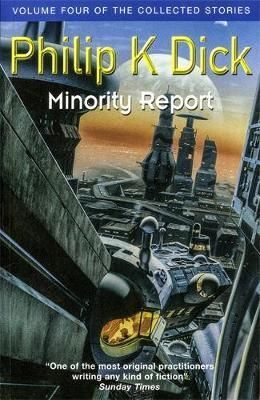Book Review: Minority Report – Volume Four of the Collected Stories by Philip K Dick
Before reading this collection of stories, put out of your mind any memory of the Tom Cruise/Stephen Spielberg film of the same name. The Cruise/Spielberg film was very loosely based on Philip K Dick’s story, taking only a few elements out of the story. The original story is far superior to the brightly coloured adventure film that bears the same name.
In his best fiction, and this collection certainly contains some of that, Philip K Dick was a visionary—a dark visionary with a downbeat but all too real take on the future.
The title story, Minority Report, is set in the Bureau of Pre-Crime where three pre-cogs (people so brain damaged that they live in permanent comas and constantly mutter their predictions) predict murders not yet committed, but this is where the similarity with the Cruise/Spielberg film ends. This is a post nuclear war world, where vast swathes of the country are a burnt wasteland. The central character is a middle-aged, overweight man with a much younger wife who finds himself at the centre of a political assassination plot. This is a twisting political thriller set in a world mutated by radiation, where every piece of new information causes another change of direction. Within this story Dick asks the question, if we know what the future holds does that automatically change the future to an unknown one?
A lot of these stories are set in post nuclear war worlds, a theme very popular in Philip K Dick’s fiction, but they are not the same world rehashed for different stories. Whatever worlds he sets his stories in they are dark and unforgiving worlds. His future is not bright, clean and hopeful.
In this collection there are stories about robots used for assassination; automatic factories that rule the world and don’t want to give that up power; the search for a war criminal who is more or less than he seems; a government sanctioned machine that controls your thoughts; an America where the first lady is the most important person and even if the presidents come and go she remains the same; a future where they look to 1960s sci-fi to solve their technological problems; a time-travelling business woman; and much, much more.
A problem that can be levelled at Phillip K Dick’s novels is that, though often with an original plot premise, he did not know how to end them. This does not apply to these stories, even the longer ones. With these stories Dick ends them perfectly, whether it is an ending to a story or a question left up in the air. Most of these stories were previously published in American sci-fi magazines of the 1950s and 1960s; whether this is the reason for their solid structures I don’t know, but these are very satisfying stories to read and have not aged the way a lot of sci-fi from that period has.
Forgot the bright, clean and upbeat sci-fi of Stephen Spielberg, George Lucas and Star Trek; try the dark and all too real sci-fi of Philip K Dick. Some of the peripheral details of his stories may have aged but their central themes are still fresh and still relevant today.
Edited by Drew Payne
to enter category
-
 1
1




0 Comments
Recommended Comments
There are no comments to display.
Create an account or sign in to comment
You need to be a member in order to leave a comment
Create an account
Sign up for a new account in our community. It's easy!
Register a new accountSign in
Already have an account? Sign in here.
Sign In Now